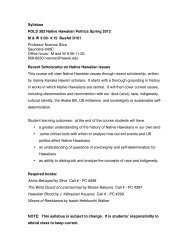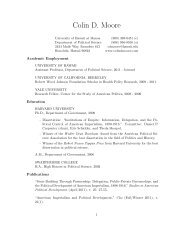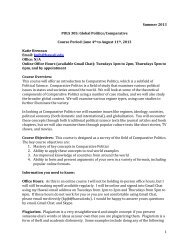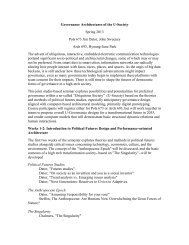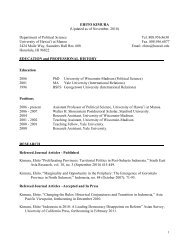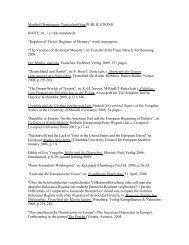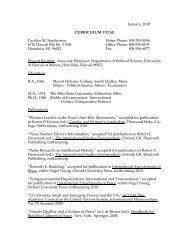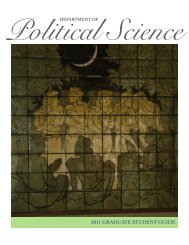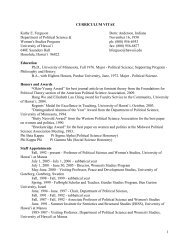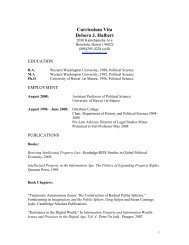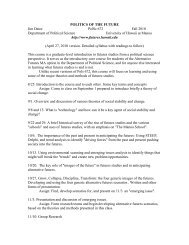Spring 2013 POLS 302 Syllabus [PDF] - Department of Political ...
Spring 2013 POLS 302 Syllabus [PDF] - Department of Political ...
Spring 2013 POLS 302 Syllabus [PDF] - Department of Political ...
You also want an ePaper? Increase the reach of your titles
YUMPU automatically turns print PDFs into web optimized ePapers that Google loves.
Pr<strong>of</strong>. Noelani Goodyear-Kaʻōpua Office: Saunders 609<br />
goodyear@hawaii.edu<br />
Office hours: T/R 10am-12pm<br />
Native Hawaiian Politics (<strong>POLS</strong> <strong>302</strong>)<br />
<strong>Spring</strong> <strong>2013</strong> - Tues/Thurs 3:00 – 4:15pm<br />
Course Description<br />
This course provides a critical study <strong>of</strong> issues in contemporary Native Hawaiian politics,<br />
with an emphasis on application and active engagement. This semester we will be<br />
focusing on four key areas that impact Hawaiian lands and communities in the present:<br />
land use, sovereignty, education, and energy. Within these broad areas, students will be<br />
able to select issues that are particularly meaningful to them and to their communities<br />
for more in-depth study.<br />
One <strong>of</strong> the features <strong>of</strong> Native Hawaiian political studies, particularly as it has been<br />
practiced at UH Mānoa, is its practitioners’ active and engaged scholarship. In other<br />
words, Hawaiian political scholars have long been concerned that their work has utility<br />
for Hawaiian communities beyond the academy and that academic work be grounded in<br />
the experiences <strong>of</strong> Kanaka Maoli past and present. In this course, you will be expected to<br />
engage with communities beyond the campus boundaries and to consider respectful and<br />
effective ways to build those relationships. We will consider various Hawaiian<br />
movement-building approaches and the importance <strong>of</strong> framing political discourse.<br />
While our focus is on Native Hawaiian politics, you will also asked to think about how<br />
to build coalitions across differences and to reflect on the ways in which efforts to<br />
alleviate the oppression <strong>of</strong> Native Hawaiians may sometimes be premised on or<br />
complicit with the oppression <strong>of</strong> other groups. Thus, this course takes the politics <strong>of</strong><br />
solidarities seriously.<br />
If politics can be broadly understood as the ways collective decisions are made and<br />
implemented, the form <strong>of</strong> the course mirrors the content <strong>of</strong> what we are learning. This is<br />
a project-based course, meaning that it is organized around the completion <strong>of</strong><br />
collaborative and individual, student-driven projects. In this class, you practice working<br />
in groups to gather and analyze information, debate, make decisions, design plans and<br />
reflect on your work together. This course has a Contemporary Ethical Issues (E) Focus<br />
designation. Contemporary ethical issues are fully integrated into the main course<br />
material and will constitute at least 30% <strong>of</strong> the content. At least 8 hours <strong>of</strong> class time will<br />
be spent discussing ethical issues. Through the use <strong>of</strong> lectures, discussions and<br />
assignments, students will develop basic competency in recognizing and analyzing<br />
ethical issues; responsibly deliberating on ethical issues; and making ethically<br />
determined judgments<br />
Student Learning Outcomes<br />
By the end <strong>of</strong> this course, you will:<br />
1. Historicize salient, contemporary issues, or “hot topics,” in Native Hawaiian<br />
politics.<br />
2. Develop informed opinions about political issues related to land, sovereignty,<br />
education and energy in Hawaiʻi.<br />
3. Become conversant with various theorizations <strong>of</strong> sovereignty and peoplehood,<br />
aina and territoriality, learning and pedagogy, mana and energy that emerge<br />
from political science, indigenous studies and Hawaiian studies.<br />
4. Critically examine state, media and grassroots discourses about political issues<br />
impacting Native Hawaiian people and lands.<br />
5. Consider community-organizing strategies that have been used within<br />
contemporary Hawaiian social movements.<br />
1
Pr<strong>of</strong>. Noelani Goodyear-Kaʻōpua Office: Saunders 609<br />
goodyear@hawaii.edu<br />
Office hours: T/R 10am-12pm<br />
6. Practice movement-building by designing campaigns around student-chosen<br />
issues.<br />
7. Practice critical reading, research and public comment on government and media<br />
documents.<br />
8. Examine and participate in group decision-making and visioning processes<br />
related to Hawaiʻiʻs future.<br />
9. Connect the course content to previous experiences and future commitments in<br />
your life.<br />
Required Texts<br />
Because this course focuses primarily on current issues, the majority <strong>of</strong> the readings will<br />
be available through Laulima and our course website. We will be reading selections from<br />
the books listed below. They are excellent references and I recommend buying them,<br />
however the relevant sections will be made available to you in digital form.<br />
Recommended texts:<br />
Cooper, George, and Gavan Daws. Land and Power in Hawaii: The Democratic Years.<br />
Honolulu: University <strong>of</strong> Hawaii Press, 1990.<br />
Trask, Haunani-Kay. From a Native Daughter: Colonialism and Sovereignty in Hawaiʻi.<br />
Revised ed. Honolulu: University <strong>of</strong> Hawaiʻi Press, 1999.<br />
Van Dyke, Jon M. Who Owns the Crown Lands <strong>of</strong> Hawaiʻi? Honolulu: University <strong>of</strong><br />
Hawaiʻi Press, 2008.<br />
Assignments and Grading<br />
15% Written & Oral Exercises in-class on readings<br />
(3 pts for 10 class sessions = 30 pts possible)<br />
If you want to pass the class and make the most <strong>of</strong> your learning experience, you must<br />
do all the readings and come to class prepared to discuss them. The written and oral<br />
exercises in class are designed to help you process the readings, as well as to<br />
demonstrate that youʻve done them prior to arriving at class. They may include written<br />
summaries, impromptu debates, guided discussion, role-plays, and other formats.<br />
Activities will generally be done at the beginning <strong>of</strong> the class. Sometimes they will be<br />
group activities. You need to be in class in order to earn the points. Both written and<br />
oral exercises will be graded on the following scale:<br />
3 – Shows you understood the reading and put in stong effort. Actively worked to<br />
include contributions from all group members in group work.<br />
2 – Some effort. Shows only partial reading. For group work, draws only on<br />
contributions from some group members.<br />
1 – Made an attempt but didnʻt show any understanding <strong>of</strong> the reading. Group<br />
work relies only on one individual.<br />
0 – No attempt.<br />
20% Engaged learning (40 pts)<br />
2
Pr<strong>of</strong>. Noelani Goodyear-Kaʻōpua Office: Saunders 609<br />
goodyear@hawaii.edu<br />
Office hours: T/R 10am-12pm<br />
Integration <strong>of</strong> classroom learning with real-world experiences allows for deep and<br />
meaningful learning. You must complete one activity in each <strong>of</strong> the following<br />
categories:<br />
1. Testimony (20 pts)<br />
Write a formal testimony that can be submitted to a specific government body or<br />
institutional entity concerning your stance on a current political issue in Hawaiʻi.<br />
Examples: submit public comment for an EIS currently under review, submit testimony<br />
on a particular bill going through the legislature, etc.<br />
2. Hana lima (20 pts)<br />
For this assignment, you will visit, learn about, and help out at any community space or<br />
organization that is not affiliated with UHM. Your time must allow you to either interact<br />
with ʻāina and/or with Kānaka Maoli who are not a part <strong>of</strong> the UH system. Select an<br />
organization, group or ʻāina that is related to the issues around which you want to build<br />
your campaign. For instance, if you wanted to build a campaign around food<br />
sovereignty, you might volunteer to work with: Maʻo organic farms in Lualualei, Heʻeia<br />
fishpond, He Hawaiʻi Au loʻi kalo in Waiāhole, or Aihualama loʻi in Mānoa. If you are<br />
building a campaign around demilitarization, you might want to work with groups like<br />
Hawaiʻi Peace and Justice or the Protect Kahoʻolawe ʻOhana.<br />
55% Student-driven and designed campaign -- Group project (110 pts)<br />
1. Strategic plan for your campaign: includes identifying your base, your<br />
outreach strategies, the ethics and narratives around which you are<br />
framing the issue, your goals/objectives, any targeted decision-makers or<br />
influential players, and any planned actions. (30 pts)<br />
2. A press release (20 pts)<br />
3. A 1-2 page position paper or video communication, aimed at reaching<br />
your political base (30 pts)<br />
4. A collective vision <strong>of</strong> a preferred future in Hawaiʻi (30pts)<br />
Create a collective vision for some aspect <strong>of</strong> Hawaiʻiʻs future. There are a few ways you<br />
might approach this task.<br />
a. Start with a problem: “Hawaiʻi is too dependent on imported food,” or<br />
“There arenʻt enough alternatives for Native Hawaiian and Pacific<br />
Islander youth who are dropping out <strong>of</strong> the public school system.”<br />
Your vision could then be a way to address the root causes <strong>of</strong> the<br />
problem.<br />
b. Start with the needs <strong>of</strong> a particular community: “With the closure <strong>of</strong><br />
Molokaʻi Ranch, people need other ways to support their families,” or<br />
“Mahu youth need more role models in Hawaiʻi public schools. are<br />
underrepresented as teachers within .” Your vision would then<br />
address that need. In any case, your vision will be developed<br />
collectively. It should be represented both visually and in writing. Feel<br />
free to use a multi-media approach, if your group has the skills to do<br />
so. Your group will be assigned a graduate student mentor to support<br />
your work. The visions will be presented publicly.<br />
c. Start with a dominant, “common sense” argument: “Oʻahu needs more<br />
construction in order to provide jobs for a growing population,” or<br />
“Hawaiians should just accept that Hawaiʻi is a part <strong>of</strong> the US now.”<br />
Rather than simply protesting or criticizing the prevailing argument or<br />
action, posit an alternative vision for what Hawaiʻi could be if we were<br />
to think differently.<br />
3
Pr<strong>of</strong>. Noelani Goodyear-Kaʻōpua Office: Saunders 609<br />
goodyear@hawaii.edu<br />
Office hours: T/R 10am-12pm<br />
10% Final Exam (20 pts possible)<br />
Exams will be in essay format, focusing on key concepts from readings, in-class<br />
discussions and other assignments.<br />
Grading scale for the course:<br />
97-100% = A+<br />
94-96% = A<br />
90-93% = A-<br />
87-89% = B+<br />
84-86% = B<br />
80-83% = B-<br />
77-79% = C+<br />
74-76% = C<br />
70-73% = C-<br />
67-69% = D+<br />
64-66% = D<br />
60-63% = D-<br />
Pr<strong>of</strong>. Noelani Goodyear-Kaʻōpua Office: Saunders 609<br />
goodyear@hawaii.edu<br />
Office hours: T/R 10am-12pm<br />
how to properly use and credit sources, ask me for advice. You can also consult numerous online<br />
sources that provide tips on academic writing.<br />
Reasonable Accommodation Policy: If you feel you need reasonable accommodations<br />
because <strong>of</strong> the impact <strong>of</strong> a disability, please 1) contact the KOKUA Program (V/T) at<br />
956-7511 or 956-7612 in room 013 <strong>of</strong> QLCSS; 2) speak with me privately to discuss your<br />
specific needs. I will be happy to work with you and the KOKUA Program to meet your<br />
access needs.<br />
Schedule<br />
Topics and learning<br />
objectives<br />
Readings (to be done before coming to class)<br />
Unit I:<br />
Kuleana,<br />
ethics and<br />
Hawaiian<br />
social<br />
movements<br />
1/8<br />
Kuleana: Situating<br />
ourselves in relation to<br />
place, culture and<br />
ethical standards<br />
1/10 20 th century Hawaiian<br />
social movement:<br />
Frames and strategies<br />
Workshop: Strategies<br />
in political organizing<br />
1/15 Historical perspectives<br />
on kuleana<br />
1/17 Whose kuleana? Non-<br />
Hawaiians in<br />
Hawaiian movements<br />
1. Trask, Haunani-Kay. “The Birth <strong>of</strong> the Modern<br />
Hawaiian Movement: Kalama Valley, Oʻahu”<br />
2. Saranillio, “Colliding Histories: Hawai‘i Statehood at<br />
the Intersection <strong>of</strong> Asians Ineligible to Citizenship’ and<br />
Hawaiians ‘Unfit for Self-Government’.””<br />
1. Kamakau, Samuel Manaiakalani. Ka Poʻe<br />
Kahiko: The People <strong>of</strong> Old.<br />
2. Young, Kanalu. “Kuleana: Toward a<br />
Historiography <strong>of</strong> Hawaiian National<br />
Consciouness, 1780-2001.”<br />
Warner, Sam L. Noʻeau. “Kuleana: The Right,<br />
Responsibility, and Authority <strong>of</strong> Indigenous<br />
Peoples to Speak and Make Decisions for<br />
Themselves in Language and Cultural<br />
Revitalization.”<br />
Unit II: ʻĀina<br />
and<br />
Territoriality<br />
1/22<br />
Aloha ʻĀina:<br />
Theorizing land-based<br />
relationships<br />
Workshop:<br />
Establishing ethical<br />
foundations in<br />
community organizing<br />
Osorio, “Hawaiian Souls: The Movement to Stop the<br />
US Military Bombing <strong>of</strong> Kahoʻolawe<br />
5
Pr<strong>of</strong>. Noelani Goodyear-Kaʻōpua Office: Saunders 609<br />
goodyear@hawaii.edu<br />
Office hours: T/R 10am-12pm<br />
1/24<br />
1/29<br />
1/31<br />
Land and power:<br />
Who controls the<br />
public lands trust (aka<br />
“ceded” or seized<br />
Hawaiian national<br />
lands)?<br />
“Koe no na kuleana o<br />
na kanaka ma loko”:<br />
What kuleana<br />
remains?<br />
Guest speaker: TBA<br />
The Public Lands<br />
Development<br />
Corporation<br />
Excerpts from<br />
1. Cooper, George, and Gavan Daws. Land and Power<br />
in Hawaii: The Democratic Years.<br />
2. Van Dyke, Jon M. Who Owns the Crown Lands <strong>of</strong><br />
Hawaiʻi?<br />
Hawaii and US Supreme Court decisions:<br />
1. Public Access Shoreline Hawaii v Hawaii<br />
County Planning Commission (1995);<br />
2. State <strong>of</strong> Hawaii v Office <strong>of</strong> Hawaiian Affairs<br />
(2009)<br />
3. Garavoy, “Ua koe ke kuleana o na kanaka: Integrating<br />
kuleana rights and land trust priorities in Hawaii”<br />
Act 55, administrative rules, testimonies and<br />
popular media coverage on the Public Lands<br />
Development Corporation<br />
Workshop: Writing<br />
and presenting<br />
testimony<br />
2/5 Militarization and<br />
cooptation<br />
Niheu, “Puʻuhonua: Sanctuary and Struggle at Mākua”<br />
2/7 Workshop: Building a<br />
campaign, the<br />
importance <strong>of</strong> framing<br />
and base-building<br />
Unit III:<br />
Ea and<br />
Sovereignty<br />
2/12<br />
Native Hawaiian<br />
community-based<br />
initiatives for<br />
sovereignty<br />
Guest speaker: TBA<br />
2/14 Legalist approaches to<br />
Hawaiian national<br />
sovereignty<br />
2/19 Theorizing kuleana<br />
and nation<br />
Walker, “The Hawaiian Renaissance and Hawaiian<br />
Surfers” in Waves <strong>of</strong> Resistance<br />
Ka Lāhui Hawaiʻi, Hoʻokupu a ka lāhui.<br />
1. Sai, David Keanu. “The American Occupation<br />
<strong>of</strong> the Hawaiian Kingdom: Beginning the<br />
Transition from Occupied to Restored State”<br />
2. Protest and demand filed with the United<br />
Nations General Assembly by David Keanu Sai<br />
on behalf <strong>of</strong> the Hawaiian Kingdom.<br />
Goodyear-Kaʻōpua, Kuleana Lāhui: Collective<br />
responsibility for Hawaiian Nationhood in Activists’<br />
Praxis<br />
6
Pr<strong>of</strong>. Noelani Goodyear-Kaʻōpua Office: Saunders 609<br />
goodyear@hawaii.edu<br />
Office hours: T/R 10am-12pm<br />
2/21<br />
2/26 State-level Native<br />
Hawaiian Registry<br />
2/28 Project work day<br />
Unit IV:<br />
Education<br />
and Pedagogy<br />
3/5<br />
3/7 Community-based<br />
pedagogies<br />
Kauanui, “Precarious Positions: Native Hawaiians and<br />
US Federal Recognition”<br />
Act 195, establishing the Kanaʻiolowalu registry process<br />
1. Beniamina, Jean Ilei Keale. “Tēnā: A<br />
Learning Lifestyle.”<br />
2. Excerpts from: Blaich, Mehana. “Mai Uka a i<br />
Kai: From the Mountains to the Sea, ʻĀina-<br />
Based Education in the Ahupuaʻa <strong>of</strong> Waipā”<br />
Hui Naʻauao materials<br />
Workshop:<br />
3/12 Student organizing,<br />
direct action and<br />
ethical practice<br />
Guest speaker: TBA<br />
3/14 The rationale for<br />
Hawaiian culturebased<br />
education<br />
3/19<br />
Workshop: Framing a<br />
collective vision for<br />
preferred futures<br />
3/21 Ethics <strong>of</strong> Indigenous<br />
scholarship<br />
Perry, “Makeʻe Pono Lāhui Hawai‘i: A Student<br />
Liberation Moment”<br />
1. Excerpts from: Kahakalau, Kū. “Kanu o Ka<br />
ʻĀina--Natives <strong>of</strong> the Land From Generations<br />
Back: A Pedagogy <strong>of</strong> Hawaiian Liberation”<br />
2. White paper on “Education with Aloha”<br />
Goodyear-Kaʻōpua, Noelani. “Rebuilding the ʻAuwai:<br />
Connecting Ecology, Economy and Education in<br />
Hawaiian Schools”<br />
1. Alfred, Taiaiake. “Warrior Scholarship:<br />
Seeing the University as a Ground <strong>of</strong><br />
Contention.”<br />
3/25–29 SPRING BREAK!<br />
Unit V:<br />
Energy and<br />
Mana<br />
4/2<br />
Contemporary<br />
ecological, economic<br />
and legal contexts<br />
2. Smith, Linda Tuhiwai. Decolonizing<br />
Methodologies: Research and Indigenous<br />
Peoples<br />
Hawaii Clean Energy Initiative and associated articles<br />
7
Pr<strong>of</strong>. Noelani Goodyear-Kaʻōpua Office: Saunders 609<br />
goodyear@hawaii.edu<br />
Office hours: T/R 10am-12pm<br />
4/4 Ethical dilemmas in<br />
alternative energy<br />
4/9 Ethical dilemmas in<br />
alternative energy<br />
4/11 Ethical dilemmas in<br />
alternative energy<br />
Articles on Big Wind<br />
MacGregor and Aluli, “Wao Kele o Puna and the Pele<br />
Defense Fund”<br />
Articles on geothermal development<br />
4/16 Project work day<br />
4/18 Group presentations<br />
4/23 Group presentations<br />
4/25 Group presentations<br />
4/30 Group presentations<br />
All assignments must be turned no later than the last day <strong>of</strong> class.<br />
Final exam week: May 6-10<br />
8


![Spring 2013 POLS 302 Syllabus [PDF] - Department of Political ...](https://img.yumpu.com/22818451/1/500x640/spring-2013-pols-302-syllabus-pdf-department-of-political-.jpg)
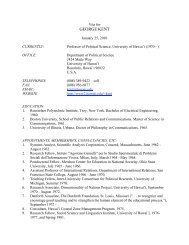
![Fall 2012 POLS 620 Syllabus [PDF] - Department of Political Science](https://img.yumpu.com/25416938/1/190x245/fall-2012-pols-620-syllabus-pdf-department-of-political-science.jpg?quality=85)
